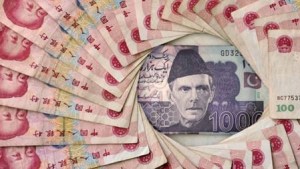China Pakistan Trade On The Up, And More Volumes In RMB Yuan. Is This A Belt & Road Anti-US$ Trend?
Op/Ed by Chris Devonshire-Ellis
 In a sign of one of the future directions that China Belt & Road trade can be expected to move in coming years, bilateral trade between China and Pakistan has increased to US$20 billion. What is interesting about this increase is the currency spread used; both sides agreed in November last year to phase out US$ trade and move to transactions being denominated in RMB Yuan. While the trade amount is relatively small, it is a harbinger of things to come if China persuades more Belt & Road nations to adopt the RMB Yuan as the preferred trade currency. Over 150 countries have agreements with China over promoting the Belt & Road Initiative under the directive of increasing bilateral trade with each. Collectively, should China increasingly encourage the use of RMB Yuan in bilateral trade and succeed in this, the global payments and networks systems currently deployed and under effective US control will no longer be as relevant as today.
In a sign of one of the future directions that China Belt & Road trade can be expected to move in coming years, bilateral trade between China and Pakistan has increased to US$20 billion. What is interesting about this increase is the currency spread used; both sides agreed in November last year to phase out US$ trade and move to transactions being denominated in RMB Yuan. While the trade amount is relatively small, it is a harbinger of things to come if China persuades more Belt & Road nations to adopt the RMB Yuan as the preferred trade currency. Over 150 countries have agreements with China over promoting the Belt & Road Initiative under the directive of increasing bilateral trade with each. Collectively, should China increasingly encourage the use of RMB Yuan in bilateral trade and succeed in this, the global payments and networks systems currently deployed and under effective US control will no longer be as relevant as today.
In other words, part of the impact the Belt & Road Initiative will have will be to usher in a decoupling of global trade from United States globally built and controlled systems. The value of the US dollar will also significantly decline.
That scenario fits in with both China and Russia acquiring large gold reserves – in a future situation where US dollar trade has declined, and global trade is partially conducted externally from US monitoring, the impact will ultimately be a challenge to the dominance of the US dollar and a lessening of US intelligence gathering and ability to react to developing trade nations. In effect, global trade will divide between those preferring the US dollar system supported by debt, and those preferring what is likely to be an alternative China-Russia banking system, supported by real assets.
We touched upon the recent trend of China and Russia increasing their gold reserves over at Russia Briefing here That situation, coupled with a Belt & Road trend of having countries move away from US$ trade will collectively over time have quite an impact. The BRICS grouping of nations, among some of the most powerful emerging markets in the world, have all agreed to move away from US$ based transactions and increase bilateral trade using their own currencies. They are also going a step further, having announced they are to establish a separate single payment system again outside the reach of the US. The Eurasian Economic Union, backed by Russia, increased its intra-trade volumes by 38% last year and also managed to de-dollarize its trade volumes by 70%.
Other bilateral agreements between the likes of China, Russia, Iran and Turkey among others have also vowed to drop the usage of the US$ in trade and recommence trade in their own currencies.
Clearly, the Pakistan experience of being a Belt & Road member (Pakistan is also a major beneficiary of Chinese funding via the China-Pakistan Economic Corridor), increasing bilateral trade and enhancing the use of RMB Yuan instead of US$ seems to be a fast growing trend. China’s increasing promotion of the RMB Yuan, and the development of Russian and Chinese technologies in Blockchain, the distrust of the US dollar and a new dynamic along the Belt & Road seem likely to put the United States under some form of economic pressure, if not now, then at least later. Whether that will be the decoupling of half of the worlds trade partners from US backed systems such as the inter-banking networks, US based corresponding banks, and networks such as SWIFT, together with a need to revert to asset backed financing, or a very sharp shock to the viability of the US management and monitoring of the global payments system including the US dollar remains to be seen. But clearly, something is afoot, and a new global payments and trading system excluding the United States seems to be emerging. The Pakistan situation is just the start.
About Us
Silk Road Briefing is produced by Dezan Shira & Associates. Chris Devonshire-Ellis is the practice Chairman. The firm has 26 years of China operations with offices throughout China, Asia and Europe. Please refer to our Belt & Road desk or visit our website at www.dezshira.com for further information.
 Related Reading:
Related Reading:
![]() US Congress 2019 China Report Calls China’s Belt & Road A “Preference For A Multipolar World Order.”
US Congress 2019 China Report Calls China’s Belt & Road A “Preference For A Multipolar World Order.”
![]() Eurasian Economic Union De-Dollarizes 70 Percent of its 2018 Trade
Eurasian Economic Union De-Dollarizes 70 Percent of its 2018 Trade
![]() Russia Dumps US Treasuries, Converts into Gold and IMF Securities. Will China Follow?
Russia Dumps US Treasuries, Converts into Gold and IMF Securities. Will China Follow?





